Gator Bowl Stadium
The Gator Bowl was an American football stadium in Jacksonville, Florida. Originally built in 1927, all but a small portion was razed in 1994 in preparation for the NFL's Jacksonville Jaguars' inaugural season; the reconstructed stadium became Jacksonville Municipal Stadium, now TIAA Bank Field. The old stadium and its replacement have hosted the Gator Bowl, a post-season college football bowl game, since its inception in 1946. It also hosted the Florida–Georgia game, an annual college football rivalry game between the University of Florida and the University of Georgia, and was home to several professional sports teams, including the Jacksonville Sharks and Jacksonville Express of the World Football League (WFL), the Jacksonville Tea Men soccer team, and the Jacksonville Bulls of the United States Football League.
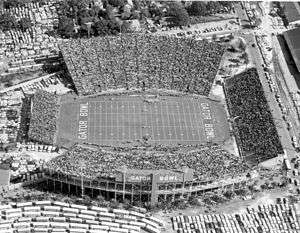 The Gator Bowl in 1961 | |
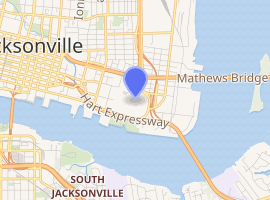
| |
| Former names | Fairfield Stadium (1927–1948) |
|---|---|
| Coordinates | 30°19′26″N 81°38′15″W |
| Owner | City of Jacksonville |
| Operator | City of Jacksonville |
| Capacity | 7,600 (1927–1947) 16,000 (1948) 36,058 (1949–1956) 62,000 (1957–1973) 72,000 (1974–1983) 80,126 (1984–1994) |
| Surface | Natural grass |
| Construction | |
| Broke ground | 1927 |
| Opened | 1928 |
| Closed | 1994 |
| Demolished | 1994 |
| Tenants | |
| Florida–Georgia football game (1933–1993) Gator Bowl (NCAA) (1946–1993) Jacksonville Sharks (WFL) (1974) Jacksonville Express (WFL) (1975) Jacksonville Tea Men (NASL/ASL/USL) (1981–1984) Jacksonville Bulls (USFL) (1984–1985) | |
Origins
Jacksonville's first football venue was built in 1927 and 1928 with a seating capacity of 7,600. Known as Fairfield Stadium, its primary purpose was to serve as home field for Jacksonville's three new high schools – Lee, Jackson and Landon. At the opening of the stadium, Florida Governor John W. Martin called the stadium "the best place in Florida to watch a football game!"
On January 1, 1946, the stadium received national attention when it hosted the first Gator Bowl game. The stadium was expanded to 16,000 seats in 1948, and the structure was renamed the Gator Bowl.[1] Prior to the 1949 game, the seating capacity was expanded to 36,058, at which it remained until 1957.[2]
College and professional sports franchises that used the stadium
It was home to the World Football League's Jacksonville Sharks in 1974 and the Jacksonville Express in 1975. It was the home of a North American Soccer League team, the Jacksonville Tea Men from 1981 to 1984 and then a United States Football League team, the Jacksonville Bulls from 1984 to 1985.
The stadium was the site of the Gator Bowl from 1949 to 1993. It also hosted the annual Florida–Georgia game between the University of Georgia and the University of Florida college football teams from 1933 to 1993.
The Gator Bowl hosted the 1968 and 1969 AFL All-Star Games.
The Beatles at the Gator Bowl
The Beatles played a concert at the Gator Bowl on their first American Tour on September 11, 1964. When the Beatles found out that the concert was going to be racially segregated, they refused to play there unless they allowed the audience to be desegregated, as there was no segregation in Europe. Paul McCartney went on record about their disapproval of the situation and their lack of understanding of segregation in the first place.[3] John Lennon said, "We never play to segregated audiences and we aren't going to start now. I'd sooner lose our appearance money."[4][5] City officials relented, allowing the stadium to be integrated, and the band played to a desegregated audience.[5]
The concert was held the day after Hurricane Dora struck St. Augustine and Jacksonville. Most of Jacksonville was without electricity and power was not restored for several days. Despite the hurricane, 23,000 fans attended, paying $4 and $5 for tickets. During the concert, Ringo Starr's drums were nailed to the stage because of 45 mph winds.[6]
Near-total demolition
The historic structure was almost entirely razed in 1994, as part of a massive remodeling effort which essentially built a new stadium. The new stadium was renamed Jacksonville Municipal Stadium (known as Alltel Stadium from 1997 through 2006, EverBank Field from August 2010 through June 2018, and TIAA Bank Field since June 2018). Almost none of the original infrastructure remains, except for the west upper deck (which was added in 1982) and the ramping system. While Jacksonville Municipal Stadium was being constructed, the Florida–Georgia game alternated between the two schools' home stadiums, with Florida's Ben Hill Griffin Stadium hosting in 1994 (which also hosted the 1994 Gator Bowl) and Georgia's Sanford Stadium hosting in 1995. The game resumed the following year in Jacksonville.
Gallery
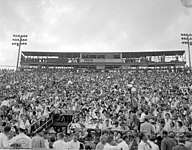 View of the audience at the 1948 Gator Bowl
View of the audience at the 1948 Gator Bowl.jpg) Aerial view of the 1954 Gator Bowl
Aerial view of the 1954 Gator Bowl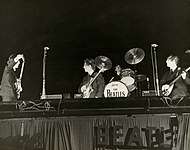 The Beatles performing at the Gator Bowl in 1964.
The Beatles performing at the Gator Bowl in 1964.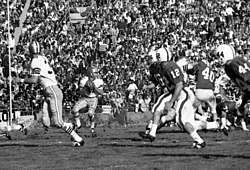 1965 Gator Bowl
1965 Gator Bowl
References
- "Gator Bowl Association History page". Archived from the original on 2011-10-16. Retrieved 2011-10-28.
- The Jacksonville Story by Carolina Rawls; Jacksonville's Fifty Years of Progress Association-1950
- Kane,Larry. Ticket to Ride: Inside the Beatles' 1964 Tour That Changed the World,p. 39
- Harry, B. Lennon Encyclopedia, p. 269
- BBC News September 18, 2011-The Beatles banned segregated audiences, contract shows
- Orlando Sentinel: September 13, 2004-DM's Beatles forums/The Beatles blew into Jacksonville once, after Hurricane Dora